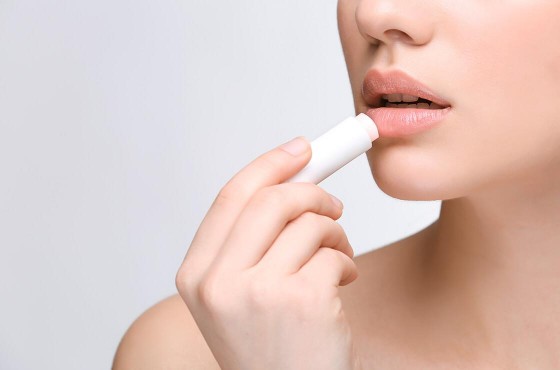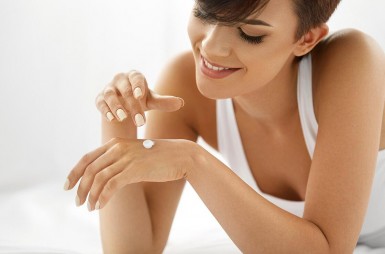Chapped lips:
rapid relief to put a smile back on your face
Written by Marion, Aesthetician/Cosmetician | published on | updated on 17/04/2024

Chapped lips may sound like a very minor ailment. However, those affected experience the rapid onset of discomfort in their day-to-day lives. Speaking and eating are suddenly much more difficult. What causes chapped lips and what is the best way to treat them? We reveal all.
The causes and consequences of cracked, chapped and dry lips
Chapped lips: what causes damage to the lips?
The skin is made up of several layers, from the hypodermis at the bottom, to the dermis and the epidermis. This latter surface layer is the one that we see. To protect it from external stressors, the epidermis is made up of a hydrolipidic film produced in part by the sebaceous glands. To guard against sun damage, melanin is also produced by the skin’s melanocytes. This brown pigment gives the skin its tanned appearance in the summer and creates a barrier to protect the skin from burning.
However, the lips do not have sebaceous glands or melanocytes, which explains why there are more delicate. Moreover, the skin on the lips is very thin and permeable. As a result of its protruding shape, the mouth, like the nose, is one of the first parts of the face to be exposed to the outdoor elements, such as the rain, wind and cold.
All of these factors combine to make the lips particularly sensitive and prone to damage.
From dry lips to chapped lips: the symptoms
There will be varying degrees of damage according to the extent of the dryness. Slightly dehydrated lips will simply look a little dry. This may give rise to minor scaliness. When dehydration persists, the scaliness becomes more intense, giving the skin on the lips a whitish appearance and causing them to split. When the chapping becomes more pronounced, the lips may develop cracking which can make them bleed. At this stage, it is painful whenever the mouth moves.
What factors encourage the development of chapped lips?
The weather is the main factor behind chapped lips. The two main causes of chapping are:
- An extremely low outside temperature, the effects of which intensify if there are windy and icy conditions,
- and prolonged exposure to the sun, which causes burnt lips.
Other factors may increase the likelihood of chapped lips:
- Regular exposure to chlorine (at the swimming pool);
- Excessive use of lipstick;
- Certain medical treatments which cause dry skin as a side effect;
- The ageing process, which reduces the skin’s suppleness and the production of collagen;
- Very acidic foods such as lemon or tomatoes;
- A vitamin B deficiency;
- An allergy.
Is there a link between chapped lips and cold sores?
There is no direct link. However, having damaged lips may encourage a cold sore to develop. If chapped lips are treated, then they generally heal very quickly. However, if they are not cared for appropriately, the condition can be made more complicated by the small splits that often accompany chapped or cracked lips. This opens the door to infections and viruses such as cold sores.
Caring for damaged lips
Take appropriate action based on the extent of the dryness
Specific treatment programmes are advised according to the extent of the dryness:
- For lips that are slightly dry, a simple stick containing shea butter or beeswax may be all you need to rehydrate the lips and protect them from environmental damage.
- For very dry lips, the richer texture of a balm is more appropriate for the early stages of chapping.
- For chapped, cracked lips, there are balms and sticks that can help to repair and heal the small lesions associated with chapping. These help to rebuild the cutaneous barrier.
Cocooncenter has a wide selection of protective balms and sticks, as well as a dedicated range of products designed to heal and repair chapped lips.
Tips and advice for preventing chapped lips
There are some effective steps you can take to prevent your lips from becoming dry:
- Make sure you drink enough. Dehydrated skin may also be a sign that you are not drinking enough water.
- Ensure that you eat foods containing vitamin B.
- Avoid wearing lipstick every day, particularly those with a matt texture that can cause dryness.
- Exfoliate your lips in the same way as you exfoliate your face. However, to protect the thin skin of the lips, use a fine-grained scrub.
- Ensure that you thoroughly remove lipstick.
- During both the summer and the winter months, get into the habit of applying a moisturising stick to protect the lips rather than waiting until the lips have started to become dry.
- Use an appropriate sun protection stick to the lips if you are in the sun or on a skiing holiday.
- Avoid licking your lips when they feel dry. This bad habit only serves to worsen the situation by increasing the dryness.
Chapped lips: old fashioned remedies that work
A number of natural solutions are famed for their ability to restore beauty to our lips. Here are a few examples:
Cucumber
Cucumber has amazing hydrating, healing properties. To take full advantage, simply press some cucumber juice and dab it gently on the lips using cotton wool. To optimise its effect, combine it with castor oil.
Honey
Honey is particularly nourishing and also has soothing, healing properties. To care for very chapped lips, apply a thick layer of honey as a mask. To optimise the effects, leave the honey to work its magic overnight.
Vaseline
Vaseline for the lips is an effective lubricant and is an ideal way to bring relief to extremely damaged lips. As with honey, apply a thick layer of Vaseline and leave it to work overnight.
Chapped lips are unsightly and unpleasant. With appropriate skincare and daily preventative action, it is easy to maintain the beauty and health of your lips.
Chapped lips: three key takeaways
- The main cause of chapped lips is exposure to extremes of hot or cold. This is why lip protection should be prioritised during the winter and the summer.
- Besides the heat and the cold, there are many factors that can cause the development of chapped lips. Chapped lips can affect anyone.
- Heed the warning of overly dry lips and use a hydrating solution to prevent chapping.

























